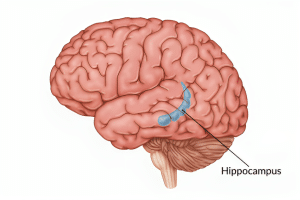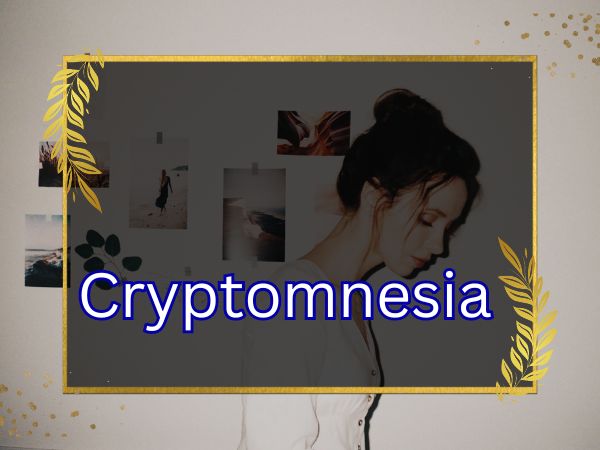Cryptomnesia Definition
Cryptomnesia is a memory bias in which a person falsely recalls generating a thought, an idea, a tune, a name, or a joke when they have encountered it previously and then forgotten it. It is not a deliberate act of plagiarism, but a result of a memory error.
Pathophysiology
According to some theories, cryptomnesia may be related to the reconstructive nature of memory, where information from different sources is combined to form a new memory, but the source is forgotten. Another possible cause is the dissociation of memories from their original context or source, making it difficult to recall where a particular idea or thought came from. Some researchers also suggest that cryptomnesia may be influenced by the unconscious processing of information, where a person may be affected by information they were not consciously aware of.
Part of Brain Involved in Cryptomnesia

Cryptomnesia may involve different parts of the brain that are responsible for memory and imagination. One possible part is the hippocampus, which is located in the temporal lobe and is important for storing and retrieving short-term memories. Another possible part is the limbic system, which is a network of structures that regulate emotions and the fight-or-flight response. The limbic system may also play a role in the recall and regulation of emotional memories, which may affect cryptomnesia.
Signs and Symptoms
Cryptomnesia may have various signs and symptoms, depending on the severity and frequency of the memory error. Some common signs and symptoms are:
- Feeling a sense of familiarity or deja vu when encountering a new idea or thought
- Having difficulty remembering the source or origin of an idea or thought
- Claiming or believing that an idea or thought is original or creative when it is borrowed or copied from someone else
- Unintentionally reproducing or plagiarizing someone else’s work, such as a melody, a phrase, or a joke
- Being accused or confronted by others for plagiarism or lack of originality
- Experiencing confusion, doubt, or guilt about one’s thoughts and ideas
Diagnosis of Cryptomnesia
Cryptomnesia can be diagnosed by comparing the person’s work or output with the source of information, and by asking the person about their memory and awareness of the source. However, diagnosis can be challenging, as the person may not be aware of their memory error or may deny it. Moreover, diagnosis can be influenced by subjective factors, such as the similarity, novelty, and complexity of the information involved.
Treatment for Cryptomnesia
Cryptomnesia can be treated by various methods, such as cognitive behavioral therapy, mindfulness meditation, and exercise. These methods can help people improve their memory, reduce stress, and increase awareness of their thoughts and feelings. Additionally, some preventive measures can be taken to avoid cryptomnesia, such as:
- Keeping track of the sources of one’s ideas and information, and giving credit where credit is due
- Reviewing one’s work or output for possible similarities or overlaps with existing sources
- Seeking feedback or opinions from others about one’s work or output
- Being mindful of the influences and inspirations that shape one’s thoughts and ideas
- Being honest and humble about one’s creativity and originality
Complications
Cryptomnesia can have various complications, such as:
- Legal or ethical issues, such as lawsuits, fines, or sanctions for plagiarism or intellectual property infringement
- Social or interpersonal problems, such as loss of trust, reputation, or respect from others
- Psychological or emotional distress, such as anxiety, depression, or low self-esteem
- Creative or intellectual stagnation, such as a lack of innovation, motivation, or growth
Cryptomnesia is a fascinating and complex phenomenon that can affect anyone, especially in creative fields and in everyday life. It is important to be aware of the causes, symptoms, and consequences of cryptomnesia, and to take steps to prevent and treat it. By doing so, one can enhance their memory, improve their creativity, and avoid potential problems.
References
(1) Cryptomnesia – Wikipedia.
(2) Cryptomnesia – The Behavioral Scientist.
(3) Brain: How It Works, Function, Parts & Conditions – Cleveland Clinic.
(4) Parts of the Brain: Anatomy, Functions, and Conditions – Verywell Mind.
(5) Cryptomnesia: a three-factor account | Synthese – Springer.
FAQs
Q: What is cryptomnesia, and how common is it?
A: Cryptomnesia is a memory glitch where you mistakenly believe an idea, tune, or piece of information is entirely your own, forgetting you encountered it somewhere else. It’s actually quite common, affecting everyone from artists to scientists.
Q: What causes cryptomnesia? Does stress play a role?
A: The exact causes are still being researched, but it likely involves a mix of factors like memory reconstruction, forgetting the source, and subconscious processing. Stress, however, can exacerbate memory issues, making cryptomnesia more likely.
Q: Is cryptomnesia harmful?
A: Unintentional plagiarism is the main concern. If you unknowingly use someone else’s work as your own, it can damage your reputation and credibility.
Q: How can I tell if I’m experiencing cryptomnesia?
A: It can be tricky! If you find yourself doubting the originality of your ideas or have a vague sense of déjà vu about them, these could be red flags. Keeping track of your inspirations and checking for overlaps with existing sources can also help.
Q: What can I do if I suspect cryptomnesia?
A: Honesty is key. If you’re unsure about the origin of your work, be transparent with others and acknowledge any potential sources. Additionally, practicing good citation habits and actively seeking feedback on your work can help prevent unintentional plagiarism.
Q: Are there ways to prevent cryptomnesia?
A: While not foolproof, certain strategies can minimize the risk. Keeping detailed notes on your ideas and sources can jog your memory later. Also, practicing mindfulness and stress-reduction techniques can improve overall memory function.
Q: Are there any famous cases of cryptomnesia?
A: Yes! Several historical figures, from writers to musicians, have faced accusations of plagiarism due to suspected cryptomnesia. These cases highlight the importance of open communication and responsible creation.
